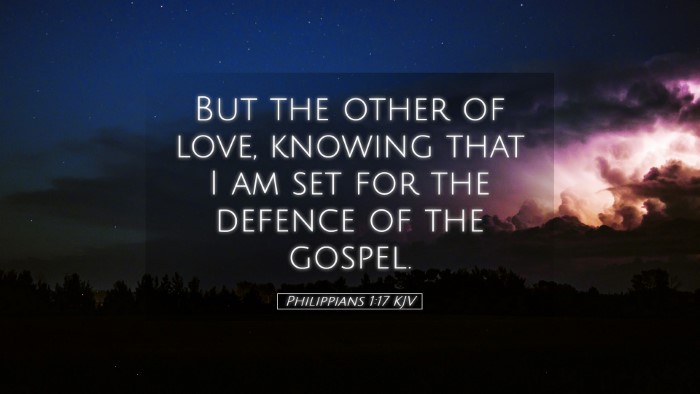Commentary on Philippians 1:17
Philippians 1:17 states: "But the other of love, knowing that I am set for the defense of the gospel." This verse invites a deeper examination of the motivations behind the preaching of the gospel and reflects the complexity of human intentions within the framework of spiritual endeavor.
Contextual Overview
To understand Philippians 1:17 thoroughly, one must look at the context in which Paul writes. Here, the Apostle Paul addresses the Church at Philippi from his imprisonment, expressing deep concern for the gospel's advancement even amid adversity.
Insights from Matthew Henry
Matthew Henry notes that the motivations behind preaching vary among individuals. He emphasizes that some preach Christ with selfish intent, while others do so out of love for God and a genuine desire to advance His kingdom. Henry writes:
- Selfish Ambition: Those preaching from contention or envy may desire to add to Paul’s affliction, illustrating how pride can corrupt a noble calling.
- Love-Fueled Ministry: In contrast, those who proclaim Christ out of love are motivated by a sincere heart, recognizing Paul’s plight and aiming to support the broader mission of the church.
Albert Barnes' Perspective
Albert Barnes offers a more analytical approach to this verse. He discusses the purpose behind the contrasting motivations of different preachers:
- Defense of the Gospel: Barnes points out that Paul feels a divine calling to defend the gospel, which brings a sense of duty to his ministry. This responsibility transcends personal circumstances.
- Awareness and Understanding: The preachers motivated by love are aware of Paul’s mission and imprisonment, which encourages them to continue preaching out of solidarity rather than rivalry.
He concludes that regardless of the motives, God's truth must ultimately prevail, encouraging readers to focus on the proclamation rather than the motives of the proclaimers.
Adam Clarke's Analysis
In his exegesis, Adam Clarke elaborates on the implications of Paul’s statement regarding love. Clarke asserts that true ministry arises from genuine affection and commitment to God:
- Contrast of Motives: Clarke highlights the stark contrast between selfish ambition and true love, noting that while some strive to diminish Paul’s influence, others uplift and support the gospel's integrity.
- Defensive Proclamation: He emphasizes that the phrase "set for the defense of the gospel" implies that Paul regards his sufferings as a necessary element in protecting the integrity of the Christian message.
Theological Reflections
This verse encourages a critical reflection on the motivations that drive individuals in ministry today. Here are some theological implications:
- The Nature of Love: True Christian love compels the believer to advance the gospel despite personal setbacks or adversities, which serves as a model for contemporary ministry.
- Self-Examination: Leaders and ministers are called to examine their motivations, ensuring that their actions stem from a place of love rather than ambition.
- God's Sovereignty: Despite varying human motives, God orchestrates the advancement of His word, reminding believers that His purposes will be fulfilled regardless of human intention.
Practical Applications
For pastors, theologians, and students, the insights gathered from Philippians 1:17 prove beneficial in various aspects of ministry:
- Encouragement for the Persecuted: This verse brings hope to those who suffer for Christ, affirming that their struggles contribute significantly to the gospel's defense.
- Encouragement in Adversity: Recognizing that love for Christ undergirds ministry can inspire perseverance even in challenging circumstances.
- Integrity in Proclamation: Ministers should strive to preach with integrity and true affection for Christ and His work, therefore enhancing their authenticity and effectiveness in ministry.
Conclusion
Philippians 1:17 serves as a reminder of the diverse motivations behind ministry, highlighting the need for love as a foundation for effective gospel proclamation. The combined wisdom from Matthew Henry, Albert Barnes, and Adam Clarke enriches our understanding of this verse, urging contemporary believers to reflect on their intentions while serving the kingdom of God. Ultimately, this passage challenges all engaged in ministry to uphold the integrity of the gospel through sincere love and unwavering commitment.


